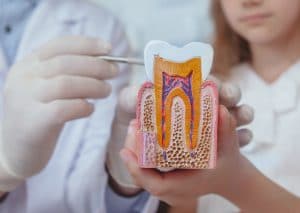 With the advanced state of modern dentistry and all we know about preventive dental care, you may be surprised to learn that a large majority of people still experience tooth decay to some degree in their lives. Tooth decay, which is the infection in your tooth structure that leads to cavity development, can range from mild to severe, depending on several different factors (such as how long you’ve had it). Today, we examine why tooth decay remains so common, and what steps you can take to prevent it from occurring, or avoid having to experience it again, if you already have.
With the advanced state of modern dentistry and all we know about preventive dental care, you may be surprised to learn that a large majority of people still experience tooth decay to some degree in their lives. Tooth decay, which is the infection in your tooth structure that leads to cavity development, can range from mild to severe, depending on several different factors (such as how long you’ve had it). Today, we examine why tooth decay remains so common, and what steps you can take to prevent it from occurring, or avoid having to experience it again, if you already have.
What tooth decay actually means
The term, tooth decay, describes the progressive erosion of your healthy, natural tooth structure, and it starts with your tooth’s protective outer layer of enamel. In its earliest stages, decay causes the protective enamel around a tooth to grow weak and erode. If this continues long enough, the enamel will become compromised and form small holes in its mineral strands. Once this occurs, oral bacteria can reach the main structure of your tooth underneath the enamel, leading to a more serious infection. As decay grows more severe, it erodes more of your tooth structure, leaving an increasingly larger cavity in its wake.
The things that come together to cause it
The biggest reason why tooth decay is so common isn’t because it’s difficult to prevent, but because it can develop easily. It begins with the accumulation of plaque on your teeth surfaces. Certain oral bacteria that make up plaque also metabolize carbohydrates, like sugar, and convert them into acids. The longer plaque remains on your teeth, the more of these acids bacteria can produce, and the more they can erode the enamel protecting your teeth. If you miss enough plaque during your hygiene routine and it calcifies into tartar, bacteria can continue eroding your tooth enamel and structure until they’re removed during your next professional dental cleaning.
There’s hope for preventing tooth decay
Though tooth decay can develop more easily than you might expect, you can also prevent it with consistently good hygiene and dental care. When you remove bacteria from your teeth surfaces, your teeth have a chance to remineralize their enamel so it regains its strength. The trick is to allow this remineralization to occur more often than bacteria can demineralize your tooth enamel. This requires consistently cleaning away bacteria, food particles, and plaque every day by brushing twice and flossing at least once. Regular dental cleanings are the only way to remove tartar once it develops, and are also necessary for successfully preventing tooth decay development.
Learn how to protect your teeth from decay
Tooth decay is common because it develops from the bacteria that naturally inhabit your mouth. To learn more about how to prevent tooth decay, schedule an appointment by calling Peddicord Family Dentistry in Ankeny, IA, today at (515) 963-3339. We also proudly serve patients of all ages who live in Bondurant, Polk City, Elkhart, Alleman, Cambridge, and all surrounding communities.



